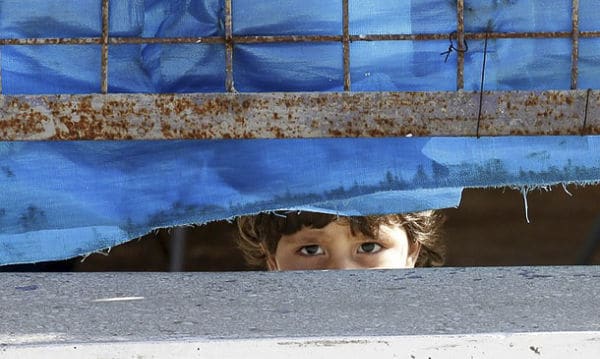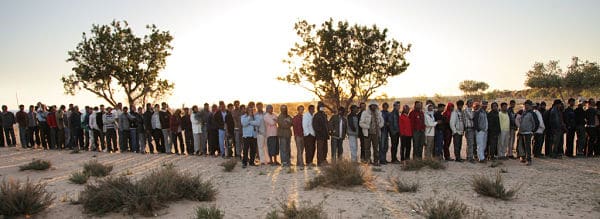In what follows I present the evolution of migrant smuggling in north Africa over the last decade in order to understand the foundations of smuggling in this region and its specific features. My goal is to argue against the prevailing eurocentric approach to irregular migration matters and for new paradigms focussed on the local level. First, I reconstruct the main features of the institutional assets creating, at the international level, the pre-conditions for smuggling activities. Then, I move to some general considerations on the specific forms organised crime may take in this region of the world, specifically with respect to corruption and irregular migration matters. The aim is to introduce a new hypothesis on the place that smugglers and the smuggling activities may take in local societies.
North Africa is a strategic area in the migration system connecting Europe, Africa and the Middle East, and regional institutional assets for the governance of migration are in permanent evolution.
In most the north African states the introduction of new visa policies, the increased patrolling of borders, and the detention of undocumented migrants became common practices during the 2000s, following a trend inaugurated in Europe in the 1990s. Progressively, punishments for not only irregular migrants but also for facilitators and smugglers have been introduced.
In comparison with the EU system, the architecture of the institutional management of migration in north Africa lacks a fundamental pillar: minimum standards for the treatment and protection of asylum seekers and vulnerable migrants (such as minors and trafficked persons). Specific provisions for them are not included in national laws, with the two exceptions being Morocco and Tunisia, which are slowly introducing reliable instruments to protect asylum seekers and regularise practices for undocumented migrants.

Photo (cropped) by Freedom House (flickr, CC BY 2.0)
Professional smugglers in the north African region have operated as key agents of migration processes in this ‘incomplete’ institutional framework since the early 1990s. Initially they assisted seasonal migrants of Mediterranean countries to overcome the increasing number of obstacles introduced by, predominantly, Spain and Italy. Efforts at the European and international levels to stop irregular migration by sea have intensified in the ensuing decades, often at great cost to both the human rights of migrants and the treasuries of EU member states. Nevertheless, all these efforts have periodically vanished due to the political instability of the neighbouring regions, which has precipitated new migration flows of newly created – and unprotected – displaced populations.
Migration flows by land and sea – pressed by institutional restrictions and fuelled by new migration pressures – have changed direction and composition many times over the years. In general, the routes have tended to either stretch further and further or to be reduced because of repressive activities, creating forms of polarisation in different cities and countries all over the region. Specifically, the reinforcement of border controls between African states has increased the demand for smuggling services not only by those heading toward the EU, but also by those moving within the region.
Diversifying flows and increasing regional migration
As a result, north Africa has become one of the regions that sees the most presence of smuggling practices, increasingly organised by structured groups. This trend was already recorded by a UN regional study in 2010. It reported a reduction of the irregular migration flows from Africa to Europe, and an increase of the movements inside the north African area. The trend was described as a result of the EU politics of ‘externalisation’ of immigration controls beyond the borders of the European Union.
As migration has intensified over the last five years, the composition of flows and the nature of smuggling networks have evolved.
Because of economic processes and political instability, on the one hand, and because of the increase of patrolling at sea, on the other, regional irregular migration in north Africa continues to increase.
Today, those still using the sea to access Europe are mainly asylum seekers and vulnerable migrants, those with the possibility of being accepted for protection within the EU. The number of north African nationals arriving in Europe – who were the first to move with the smugglers’ assistance – has fallen.
States in north Africa and the connecting regions are still facing serious and growing difficulties in managing these flows. Their responses are similar to those in place in Europe: decisions are taken to arbitrarily stop migrants with the introduction of visa systems on regional borders (between Syria, Lebanon, Egypt and Jordan; between Tunisia and Libya; and between Egypt and Libya for example), thus increasing smuggling practices; new fences are constructed and massive deportation practices implemented. Only a portion of migrants have access to assistance from international organisations (for example, UNHCR) and their human rights are often not respected.
Data gaps and exploitation on the periphery
The effects of these policies deterring migration in the region are only scarcely recorded and an analysis of the evolution of the smuggling networks operating in the countries of the global south is still lacking. At the same time, research on migrant smuggling in the Mediterranean area has always been explicitly eurocentric. From the mid-2000s onward, analysis on smuggling in the Mediterranean was conducted with data collected in Italy, to a lesser extent in Spain, and scarcely any in Turkey. Greece has become a field-study hub only recently, while academic research has rarely been conducted in key countries such as Libya, Egypt, Algeria, or in many countries of origin. This discrepancy has produced quite a significant lack of consistency in the discourse on smuggling and smugglers.
As a result, we lack a lot of the information needed to understand the impact of recent political changes on smuggling activities in North Africa. It is certain that traffic along the routes (except those heading to Spain) has increased dramatically since 2013, with a concomitant increase of deaths and accidents. Also, recent analysis based on interviews with migrants, and supported by results of judicial proceedings based on telephone intercepts of conversations between smugglers, has revealed that smuggling practices are often blurring into trafficking and kidnapping for ransom, both in Egypt and Libya. Such interviews detail the hostile environment migrants now encounter in Egypt and Libya. Quite often they move without a specific destination or goal, other than to flee precarious living conditions in their places of origin.
For them, the main objective of crossing the sea to the EU is often to find protection from persecution, not only in their origin countries, but also in other countries, such as Egypt and Libya, where they were vulnerable to exploitation including forced labour, kidnapping and sexual violence.
The role of organised crime
Professional smugglers can be considered as part of a wider system of exploitation of vulnerable migrants, part of an illegal environment formed to take advantage of basic needs and survival strategies of migrants living in hostile environments. We know that, due to vulnerabilities of undocumented migrants, a complex system of black economies has been formed around them in the last 20 years, both in Europe and in non-European countries. Recent literature has extensively described the flourishing of ghettos, the secluded economic and social areas in which undocumented migrants live. There the intermediaries, who are well connected with employers and exploiters of hosting countries, are often of the same nationality as the migrants or speak the same language.

Photo (cropped) by UN Photo/OCHA/David Ohana (flickr, CC BY-NC-ND 2.0)
From studies on organised crime, we know that the symbiosis and coexistence that exist between criminal systems and the wider society are constantly evolving. Also, we know that the degree of integration of illegal systems – their ability to continuously carry out fundamental economic activities in a local context – is proportional to the degree of extension of their ‘inter-organisational’ relationships in the broader legal field. As sociologists of the Chicago School pointed out a century ago, the leadership positions of criminal organisations are occupied by individuals with a talent for mediation, those best able to resolve disputes within the ‘underworld’ and to maintain ‘good relations’ with the outside world at the same time.
According to this approach, organised crime systems are primarily the product of an illegal organisation of power at different levels, namely supported by the corruption of the political system and the failure of the justice system. Organised crime is an expression of a social context in which the primary values are directed to immediate and personal interest, and it is successful in social arenas where all the actors act in their own interests.
Organised crime rings are successful if predatory attitudes are shared in the local environment, by politicians, businessmen, representatives of law enforcement and justice.
Given the specific institutional assets in some of the southern Mediterranean countries, highly permeated by corruption practices, it is perhaps more useful to analyse smuggling not only as an enterprise that aims to profit, but also as a network strongly connected to the political system and local administration that participates fully in the informal management of an awkward population of newcomers.
Today the crisis of the states on the southern shore, namely Libya and to a lesser extent Egypt, run parallel with a growth of mass migration movements composed of people seeking alternative living solutions. The hypothesis is that, in this framework, smugglers have had the opportunity to develop a high level of systemic integration, participating informally in local migration governance processes as well as in a wider system of exploitation of migrants. Research so far has not focused on the complex social relations supporting smugglers, entrepreneurs, officials, and militaries, all of whom benefit from smuggling activities.
Our co-producer openDemocracy offers more food for thought on human smuggling:
- Beyond common-sense notions of human smuggling in the Americas, by SOLEDAD ÁLVAREZ-VELASCO and MARTHA RUIZ
- Smuggling as social negotiation: pathways of Central American migrants in Mexico, by YAATSIL GUEVARA GONZÁLEZ
- The call to become a smuggler, by LUIGI ACHILLI
- Precarious livelihoods in eastern Indonesia: of fishermen and people smugglers, by
- Governing migrant smuggling: a criminality approach is not sufficient, by ANNA TRIANDAFYLLIDOU
- The struggle of mobility: organising high-risk migration from the Horn of Africa, by TEKALIGN AYALEW MENGISTE
- Communities of smugglers and the smuggled, by NASSIM MAJIDI
**********
Featured image by Department for International Development/Kate Joseph (flickr, CC BY 2.0)



